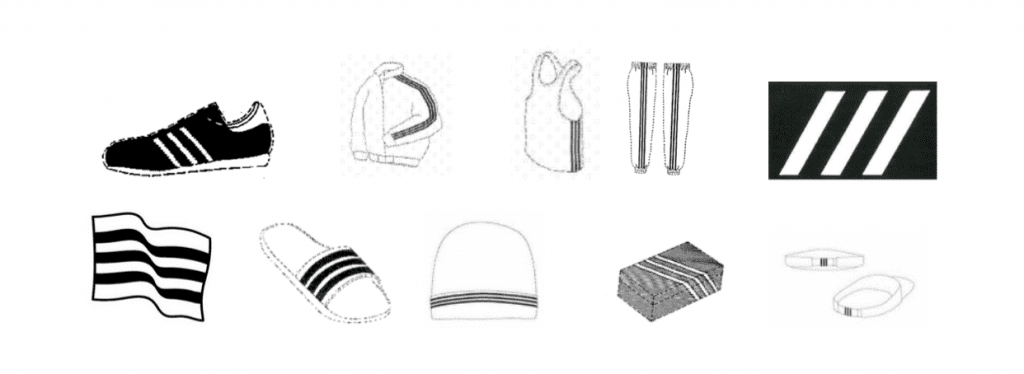Adidas’ case against Thom Browne will move forward in the wake of an unsuccessful attempt by the New York-based fashion brand to get the stripe-centric spat tossed out of court. On the heels of Thom Browne filing a motion to get adidas’ trademark infringement, unfair competition, and trademark dilution complaint suit dismissed, which was largely denied in a report and recommendation from a magistrate judge for the U.S. District Court for the Southern District of New York last month, Judge Jed Rakoff adopted the magistrate judge’s report in a move that enables adidas’ headline-making lawsuit to move forward.
“The court finds itself in complete agreement with Magistrate Judge Lehrburger’s Report and Recommendation,” Judge Rakoff stated in an order dated April 21. In particular, Judge Rakoff pointed to Lehrburger’s conclusion that adidas’ complaint “sufficiently alleges that [its] three-stripe mark functions as a unitary mark.” Not a total loss for Thom Browne, Judge Rakoff also upheld Lehrburger’s determination that adidas “improperly requests the court to sustain the pending Trademark Trial and Appeal Board opposition proceeding that adidas filed against Thom Browne’s application for a striped design mark” on the basis that the court does not have jurisdiction to sustain or overrule the pending opposition.
As such, Lehrburger – and now Judge Rakoff – determined that adidas’ request that the court sustain its opposition should be stricken.

Judge Rakoff’s order follows from a motion to dismiss that Thom Browne filed in October 2021, primarily arguing that adidas’ June 2021 complaint does not provide it with “sufficient notice of the claims against it because the complaint does not specify which of the accused products infringe which trademark registrations and which products dilute which trademarks,” adidas “lacks standing to assert its claims because it does not own the registrations,” and the court cannot sustain an opposition pending before the USPTO’s Trademark Trial and Appeal Board.”
Reflecting on these arguments last month, the magistrate judge largely sided with adidas (before sending his report and recommendation to the district court judge for determination), finding that the German sportswear giant sufficiently pled its trademark infringement, unfair competition, and trademark dilution claims, and that it has standing to bring such claims against Thom Browne.
Primarily, Thom Browne claimed that adidas’ complaint falls short of the requisite pleading standard, as it does not specify exactly which of the 24 trademark registrations that adidas cites in its complaint (all of which extend to its famed three-stripe mark) are being infringed upon and does not “sufficiently define the ‘parameters of the design’ that comprises its asserted ‘three-stripe mark.’” As Thom Browne argued in its motion to dismiss, the 24 different trademark registrations have “such significant variation that they cannot constitute a single three-stripe mark,” and thus, adidas’ complaint “lacks sufficient specificity to provide fair notice of [the plaintiffs’] claims.”
Unpersuaded by Browne’s arguments, Lehrburger stated in his report that adidas is only “required to allege sufficient facts establishing they own a protectible mark, which [it has] done.” Specifically, adidas’ complaint “provides fair notice of [its] claims, alleges facts sufficient to establish each required claim element, and adequately identifies the protected mark and the products that allegedly infringe on that mark.”

The magistrate judge asserted – and Judge Rakoff has since agreed – that adidas need not allege more than this simply because it “consistently refers to its three-stripe mark as a unitary mark,” or one that creates a commercial impression that is separate and apart from any unregistrable component. (Or as the Federal Circuit put it in the Dena Corp. case, a mark may be considered “unitary” if the elements of the mark “endow the whole with a single, integrated, and distinct commercial impression,” even if those elements would otherwise be unregistrable.)
Citing the decision of U.S. District Court for the District of Oregon in Adidas America, Inc. v. Forever 21, Inc., Lehrburger asserted that “at least one federal court has already rejected the notion that adidas’ pleading of multiple registrations and a unitary three-stripe mark requires a more definite statement.”
The case is the latest in a long line of trademark lawsuits (and proceedings before the USPTO’s Opposition Division) that adidas has waged in furtherance of an aggressive and enduring practice that sees the 73-year-old sportswear behemoth police others’ unauthorized uses of stripes when its legal counsel believes that such third-party uses are likely to confuse consumers and/or diminish the distinctiveness of adidas’ three-stripe marks and the ability of those marks to identify a single source. Putting adidas’s long-running pattern in perspective, the late Judge Garr King summarized in 2008 in an opinion in the case that adidas filed against the now-defunct Payless Shoes: between 1995 and 2008, alone, adidas had “pursue[d] over 325 infringement matters involving the three-stripe mark in the United States, filed more than 35 separate lawsuits for infringement of the three-stripe mark, and entered into more than 45 settlement agreements with companies selling infringing footwear.”
The case is adidas America, Inc., et. al., v. Thom Browne, Inc., 1:21-cv-05615 (SDNY).











